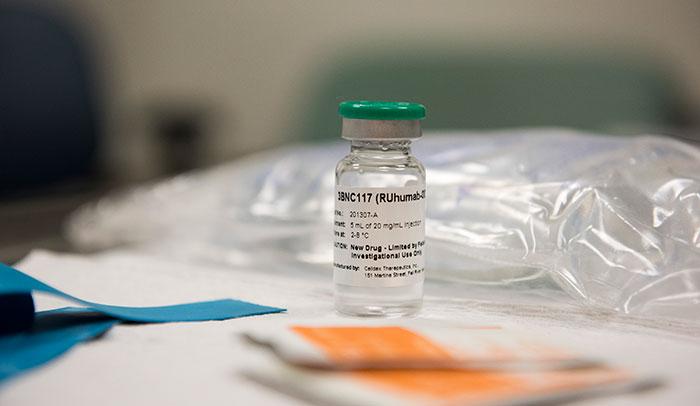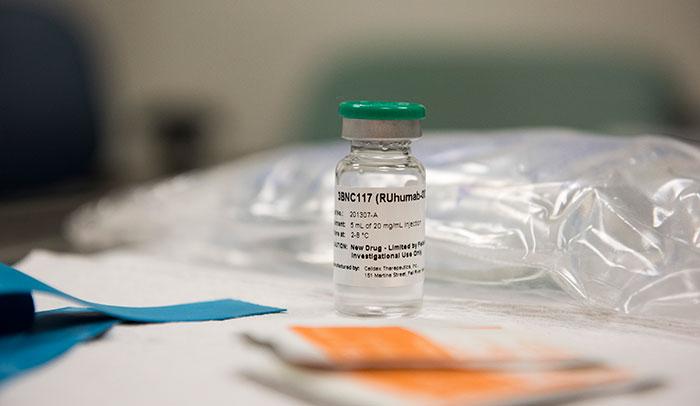
The development of antiretroviral therapy, a combination of drugs that slows the replication of HIV in the body, has transformed the treatment of this infection. What was once a certain death sentence is now a chronic condition that people can live with for decades.
But this therapy has drawbacks. There are side effects, including kidney problems, decreased bone density, and gastrointestinal problems. And if a person discontinues his or her treatment, even missing a few doses, the level of the virus in the body is able to rebound quickly.
Researchers from The Rockefeller University, along with collaborators from the University of Cologne, are developing a new kind of treatment, an antibody-based drug that may provide a better strategy for long-term control of HIV. Recent findings from a Phase 1 clinical trial, published on May 5 in Science, offer new insights about how the antibody functions.
“This study provides evidence that a single dose of an antibody stimulates patients’ immune response, enabling them to make new or better antibodies against the virus,” explains Till Schoofs, a postdoctoral fellow and one of the study’s first authors. Schoofs is a member of the Laboratory of Molecular Immunology, led by Michel Nussenzweig, Zanvil A. Cohn and Ralph M. Steinman Professor, who is the study’s senior author.
“We reported last year that this treatment can greatly reduce the amount of virus that’s present in someone’s blood,” Dr. Schoofs adds, “but we wanted to follow the patients for a longer period of time to study how their immune systems were adapting to the new therapy.”
Neutralizing a deadly virus
The molecule used in the research, 3BNC117, is called a broadly neutralizing antibody because it has the ability to fight a wide range of HIV strains. Johannes Scheid, a student in Nussenzweig’s lab, isolated it several years ago from an HIV-infected patient whose immune system had an exceptional ability to neutralize HIV in the blood by preventing the virus from infecting and destroying a specific type of immune cells, called CD4 cells, in patients. The destruction of CD4 cells is a hallmark of AIDS.
Early studies showed that 3BNC117 can neutralize more than 80 percent of HIV strains that are found around the world. The investigators therefore theorized that giving the antibody to patients would help them to fight the virus as well.
The clinical trial included 15 patients who had high levels of the virus in their blood, and 12 other patients whose virus levels were being controlled with antiretroviral therapy (ART). The majority of trial participants were treated at The Rockefeller University Hospital. The patients were infused with a single dose of 3BNC117 and were monitored over a six-month period.
The investigators found that 14 out of 15 patients who had high levels of the virus at the time they were given the antibody were making new antibodies that were able to neutralize a number of different strains of HIV.
“It usually takes several years for the body to begin to make good antibodies against HIV,” Schoofs says. “So there might be an even better effect later on, especially if patients are given more than one dose of 3BNC117.”
The next steps in this research are to test 3BNC117 in combination with other antibodies that target HIV, to determine whether an even stronger antiviral effect can be found. The researchers are also conducting a Phase 2 trial in which patients receiving ART are switched to antibody treatment.
Exploring an antibody’s function
In a companion study published in the same issue of Science, the investigators wanted to determine what further benefits treatment with 3BNC117 may have over ART.
They looked at the results of the clinical trial, and used a mathematical model of HIV dynamics to predict how the patients’ levels of HIV would have fared if 3BNC117 did nothing else than to neutralize HIV in the blood and block new infection. Their analysis showed that neutralization of the virus alone doesn’t explain the steep drop in the virus levels observed in patients–leading the scientists to suspect that there must be another component to the antibody’s efficacy.
Working in a mouse model, the researchers saw evidence that 3BNC117 was able to engage the animals’ immune cells and accelerate their clearance of HIV-infected cells. “This shows that the antibody not only can exert pressure on the virus, but also can shorten the survival of infected cells,” says first author Ching-Lan Lu, a visiting student in Dr. Nussenzweig’s lab. “Our results explain why post-exposure prophylaxis”–short-term treatment after exposure to HIV to reduce infection–“with antibodies is more effective than ART in our mouse models.”
In addition, they could potentially make it possible to address a major obstacle to curing HIV: the virus’s ability to establish a latent reservoir soon after infection, and so hide out in the body and evade treatment. A follow-up clinical study is currently underway at Rockefeller to assess whether offering antibody drugs to patients receiving ART can help reduce or alter their HIV reservoirs.
###
Media Contact
Katherine Fenz
[email protected]
212-327-7913
@rockefelleruniv
http://www.rockefeller.edu
The post Antibody therapy opens door to potential new treatment for HIV appeared first on Scienmag.





